Organisational Behaviour: 4Com Plc Report and Analysis
VerifiedAdded on 2020/11/23
|16
|5087
|217
Report
AI Summary
This report provides a comprehensive analysis of organisational behaviour, using 4Com Plc as a case study. It begins by examining the effects of culture, power, and politics on team behaviour and performance, highlighting the importance of a positive and supportive work environment. The report then delves into motivation theories, including both content and process theories, with a specific focus on Maslow's Hierarchy of Needs and its application within an organisational context. The role of power dynamics and politics within the organisation is also discussed, with emphasis on how these factors can impact employee morale and productivity. Finally, the report contrasts the characteristics of effective and ineffective teams, offering insights into how 4Com Plc can foster a more productive and engaged workforce. The report concludes with a discussion of Handy's cultural model and its applicability to 4Com Plc.
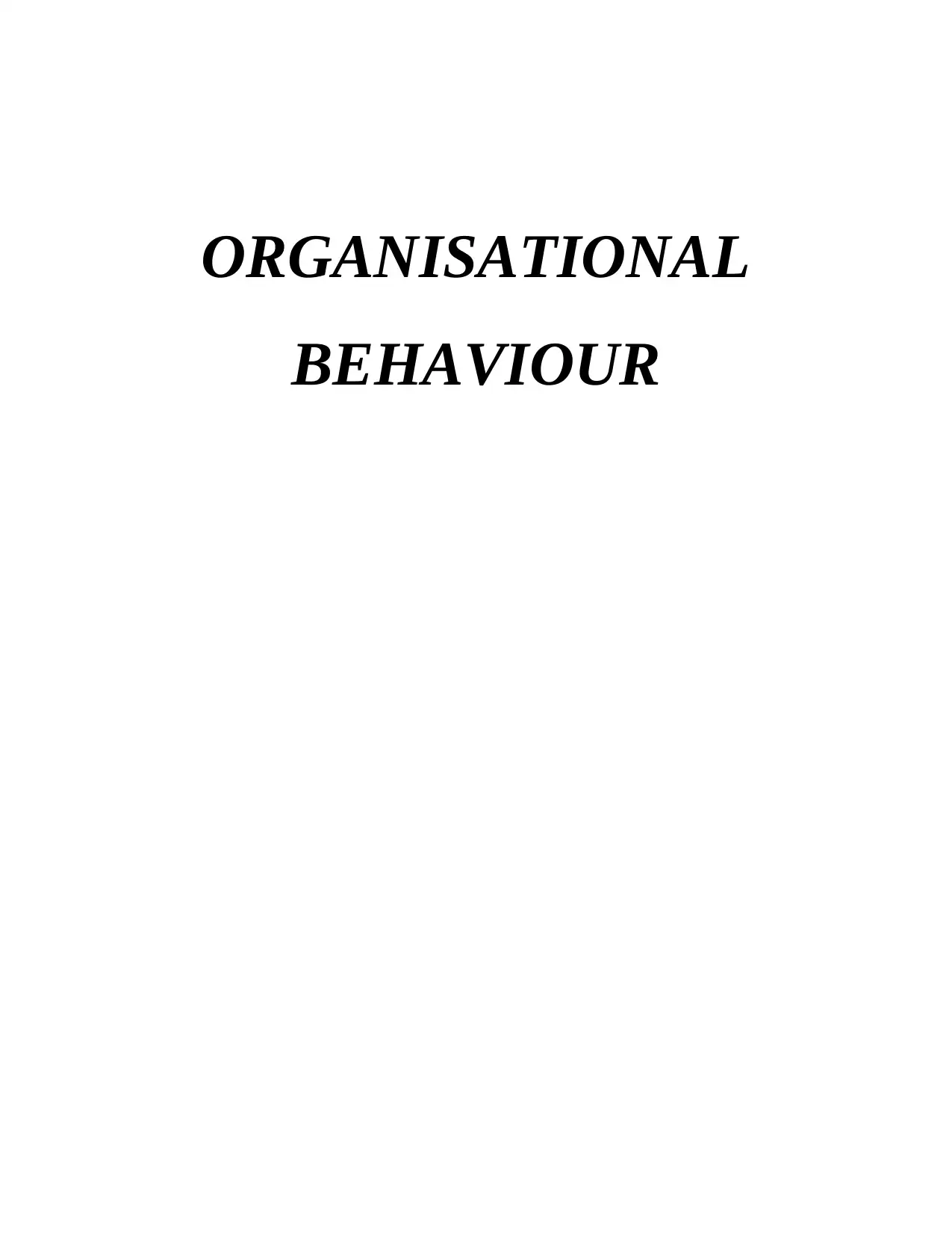
ORGANISATIONAL
BEHAVIOUR
BEHAVIOUR
Paraphrase This Document
Need a fresh take? Get an instant paraphrase of this document with our AI Paraphraser
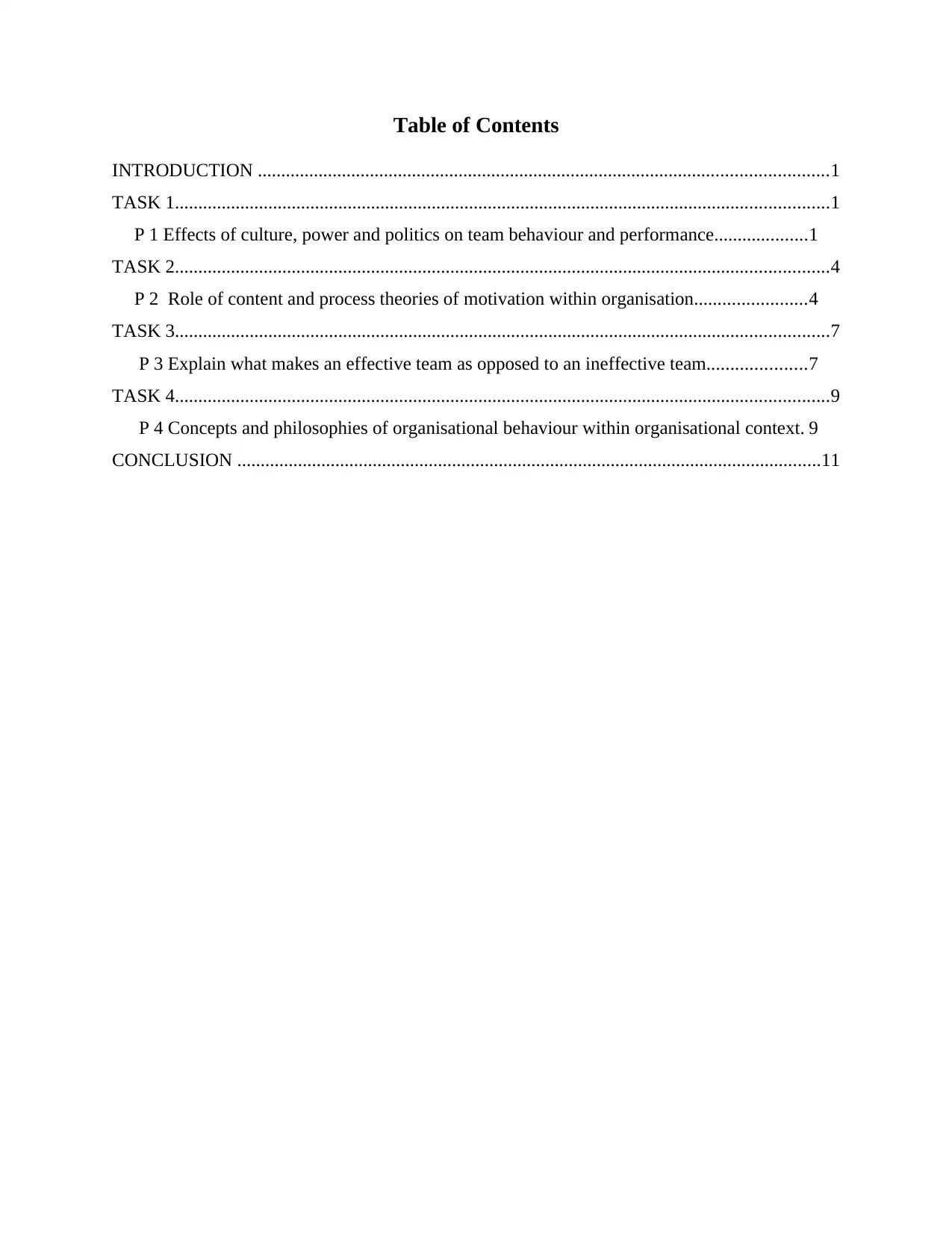
Table of Contents
INTRODUCTION ..........................................................................................................................1
TASK 1............................................................................................................................................1
P 1 Effects of culture, power and politics on team behaviour and performance....................1
TASK 2............................................................................................................................................4
P 2 Role of content and process theories of motivation within organisation........................4
TASK 3............................................................................................................................................7
P 3 Explain what makes an effective team as opposed to an ineffective team.....................7
TASK 4............................................................................................................................................9
P 4 Concepts and philosophies of organisational behaviour within organisational context. 9
CONCLUSION .............................................................................................................................11
INTRODUCTION ..........................................................................................................................1
TASK 1............................................................................................................................................1
P 1 Effects of culture, power and politics on team behaviour and performance....................1
TASK 2............................................................................................................................................4
P 2 Role of content and process theories of motivation within organisation........................4
TASK 3............................................................................................................................................7
P 3 Explain what makes an effective team as opposed to an ineffective team.....................7
TASK 4............................................................................................................................................9
P 4 Concepts and philosophies of organisational behaviour within organisational context. 9
CONCLUSION .............................................................................................................................11
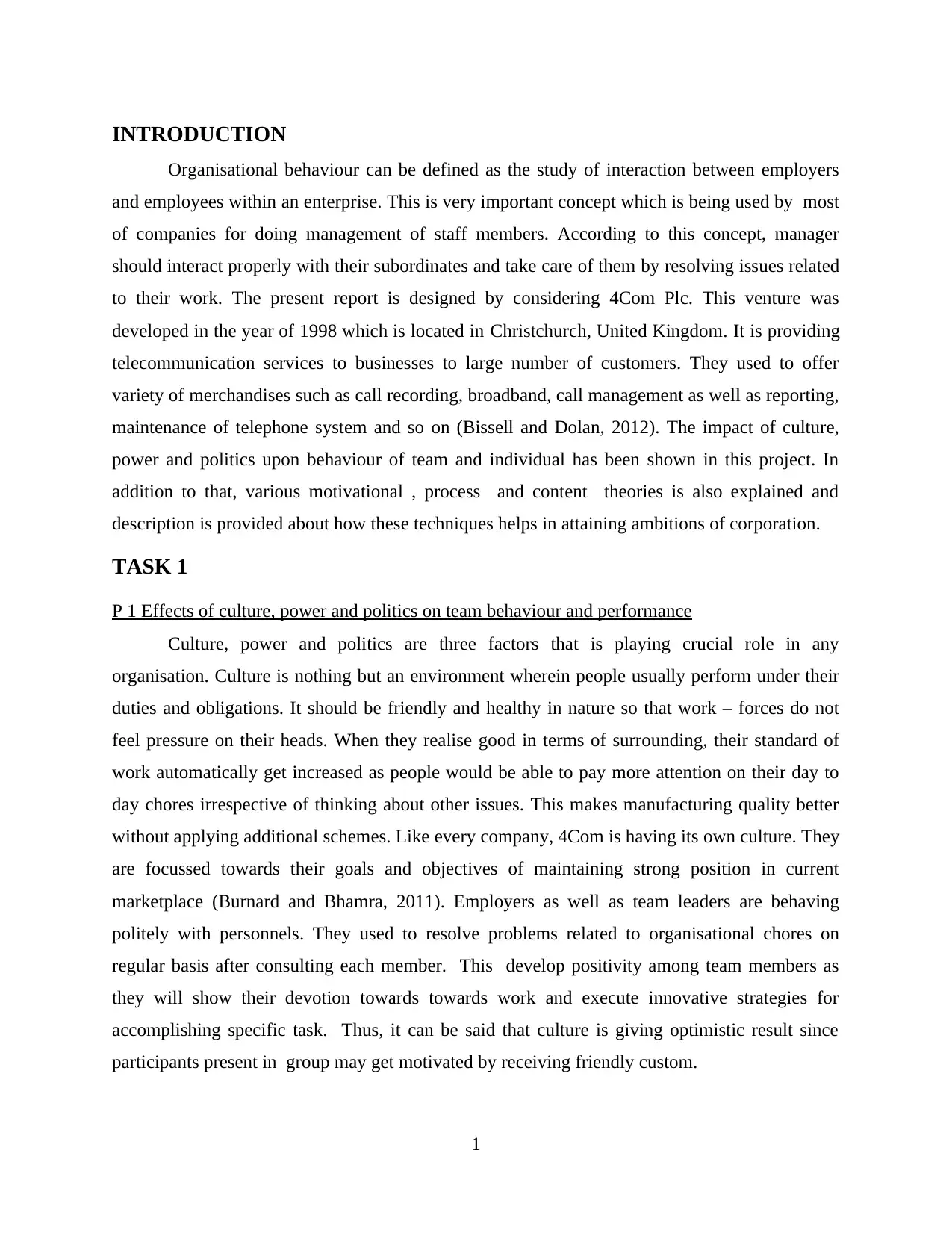
INTRODUCTION
Organisational behaviour can be defined as the study of interaction between employers
and employees within an enterprise. This is very important concept which is being used by most
of companies for doing management of staff members. According to this concept, manager
should interact properly with their subordinates and take care of them by resolving issues related
to their work. The present report is designed by considering 4Com Plc. This venture was
developed in the year of 1998 which is located in Christchurch, United Kingdom. It is providing
telecommunication services to businesses to large number of customers. They used to offer
variety of merchandises such as call recording, broadband, call management as well as reporting,
maintenance of telephone system and so on (Bissell and Dolan, 2012). The impact of culture,
power and politics upon behaviour of team and individual has been shown in this project. In
addition to that, various motivational , process and content theories is also explained and
description is provided about how these techniques helps in attaining ambitions of corporation.
TASK 1
P 1 Effects of culture, power and politics on team behaviour and performance
Culture, power and politics are three factors that is playing crucial role in any
organisation. Culture is nothing but an environment wherein people usually perform under their
duties and obligations. It should be friendly and healthy in nature so that work – forces do not
feel pressure on their heads. When they realise good in terms of surrounding, their standard of
work automatically get increased as people would be able to pay more attention on their day to
day chores irrespective of thinking about other issues. This makes manufacturing quality better
without applying additional schemes. Like every company, 4Com is having its own culture. They
are focussed towards their goals and objectives of maintaining strong position in current
marketplace (Burnard and Bhamra, 2011). Employers as well as team leaders are behaving
politely with personnels. They used to resolve problems related to organisational chores on
regular basis after consulting each member. This develop positivity among team members as
they will show their devotion towards towards work and execute innovative strategies for
accomplishing specific task. Thus, it can be said that culture is giving optimistic result since
participants present in group may get motivated by receiving friendly custom.
1
Organisational behaviour can be defined as the study of interaction between employers
and employees within an enterprise. This is very important concept which is being used by most
of companies for doing management of staff members. According to this concept, manager
should interact properly with their subordinates and take care of them by resolving issues related
to their work. The present report is designed by considering 4Com Plc. This venture was
developed in the year of 1998 which is located in Christchurch, United Kingdom. It is providing
telecommunication services to businesses to large number of customers. They used to offer
variety of merchandises such as call recording, broadband, call management as well as reporting,
maintenance of telephone system and so on (Bissell and Dolan, 2012). The impact of culture,
power and politics upon behaviour of team and individual has been shown in this project. In
addition to that, various motivational , process and content theories is also explained and
description is provided about how these techniques helps in attaining ambitions of corporation.
TASK 1
P 1 Effects of culture, power and politics on team behaviour and performance
Culture, power and politics are three factors that is playing crucial role in any
organisation. Culture is nothing but an environment wherein people usually perform under their
duties and obligations. It should be friendly and healthy in nature so that work – forces do not
feel pressure on their heads. When they realise good in terms of surrounding, their standard of
work automatically get increased as people would be able to pay more attention on their day to
day chores irrespective of thinking about other issues. This makes manufacturing quality better
without applying additional schemes. Like every company, 4Com is having its own culture. They
are focussed towards their goals and objectives of maintaining strong position in current
marketplace (Burnard and Bhamra, 2011). Employers as well as team leaders are behaving
politely with personnels. They used to resolve problems related to organisational chores on
regular basis after consulting each member. This develop positivity among team members as
they will show their devotion towards towards work and execute innovative strategies for
accomplishing specific task. Thus, it can be said that culture is giving optimistic result since
participants present in group may get motivated by receiving friendly custom.
1
⊘ This is a preview!⊘
Do you want full access?
Subscribe today to unlock all pages.

Trusted by 1+ million students worldwide
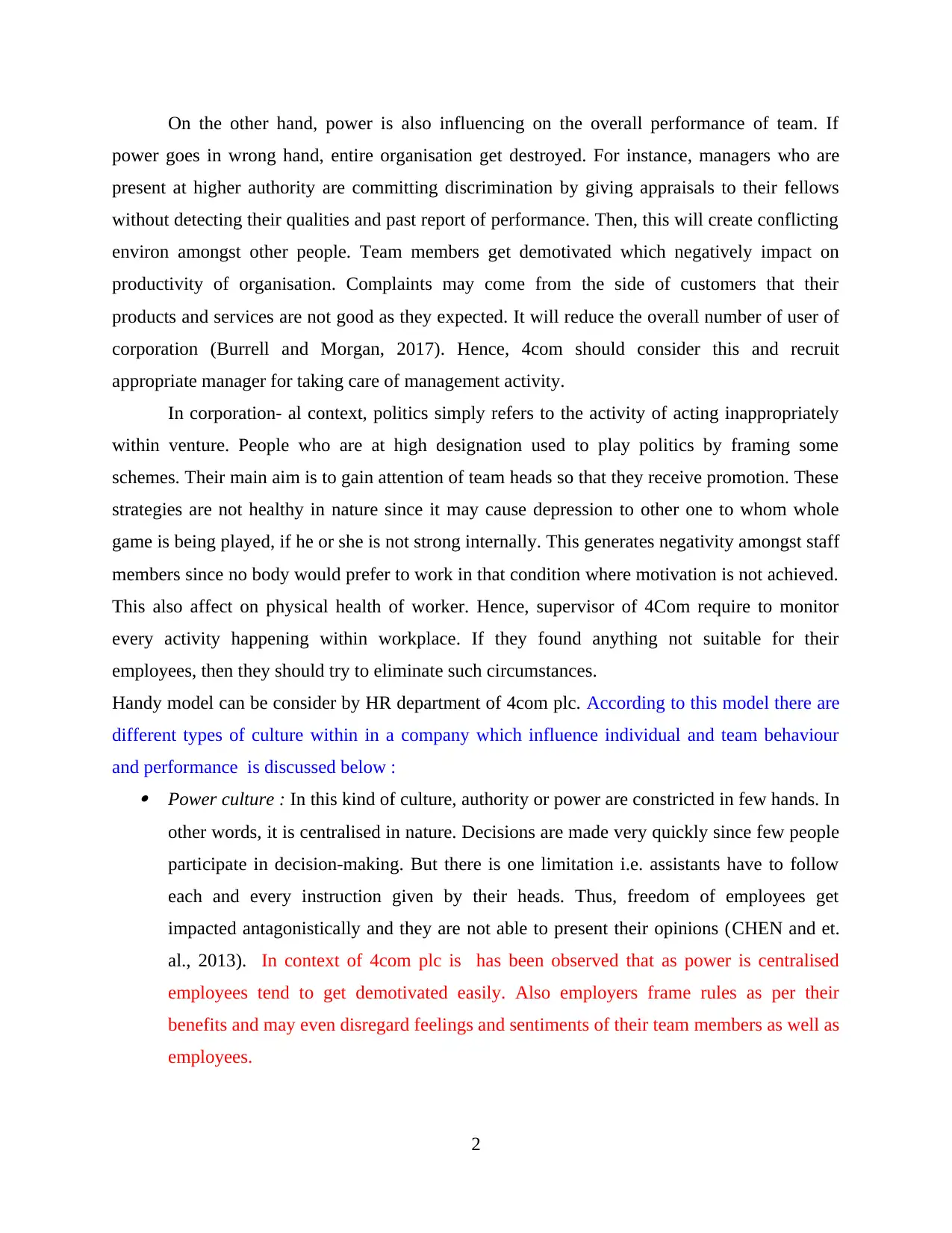
On the other hand, power is also influencing on the overall performance of team. If
power goes in wrong hand, entire organisation get destroyed. For instance, managers who are
present at higher authority are committing discrimination by giving appraisals to their fellows
without detecting their qualities and past report of performance. Then, this will create conflicting
environ amongst other people. Team members get demotivated which negatively impact on
productivity of organisation. Complaints may come from the side of customers that their
products and services are not good as they expected. It will reduce the overall number of user of
corporation (Burrell and Morgan, 2017). Hence, 4com should consider this and recruit
appropriate manager for taking care of management activity.
In corporation- al context, politics simply refers to the activity of acting inappropriately
within venture. People who are at high designation used to play politics by framing some
schemes. Their main aim is to gain attention of team heads so that they receive promotion. These
strategies are not healthy in nature since it may cause depression to other one to whom whole
game is being played, if he or she is not strong internally. This generates negativity amongst staff
members since no body would prefer to work in that condition where motivation is not achieved.
This also affect on physical health of worker. Hence, supervisor of 4Com require to monitor
every activity happening within workplace. If they found anything not suitable for their
employees, then they should try to eliminate such circumstances.
Handy model can be consider by HR department of 4com plc. According to this model there are
different types of culture within in a company which influence individual and team behaviour
and performance is discussed below : Power culture : In this kind of culture, authority or power are constricted in few hands. In
other words, it is centralised in nature. Decisions are made very quickly since few people
participate in decision-making. But there is one limitation i.e. assistants have to follow
each and every instruction given by their heads. Thus, freedom of employees get
impacted antagonistically and they are not able to present their opinions (CHEN and et.
al., 2013). In context of 4com plc is has been observed that as power is centralised
employees tend to get demotivated easily. Also employers frame rules as per their
benefits and may even disregard feelings and sentiments of their team members as well as
employees.
2
power goes in wrong hand, entire organisation get destroyed. For instance, managers who are
present at higher authority are committing discrimination by giving appraisals to their fellows
without detecting their qualities and past report of performance. Then, this will create conflicting
environ amongst other people. Team members get demotivated which negatively impact on
productivity of organisation. Complaints may come from the side of customers that their
products and services are not good as they expected. It will reduce the overall number of user of
corporation (Burrell and Morgan, 2017). Hence, 4com should consider this and recruit
appropriate manager for taking care of management activity.
In corporation- al context, politics simply refers to the activity of acting inappropriately
within venture. People who are at high designation used to play politics by framing some
schemes. Their main aim is to gain attention of team heads so that they receive promotion. These
strategies are not healthy in nature since it may cause depression to other one to whom whole
game is being played, if he or she is not strong internally. This generates negativity amongst staff
members since no body would prefer to work in that condition where motivation is not achieved.
This also affect on physical health of worker. Hence, supervisor of 4Com require to monitor
every activity happening within workplace. If they found anything not suitable for their
employees, then they should try to eliminate such circumstances.
Handy model can be consider by HR department of 4com plc. According to this model there are
different types of culture within in a company which influence individual and team behaviour
and performance is discussed below : Power culture : In this kind of culture, authority or power are constricted in few hands. In
other words, it is centralised in nature. Decisions are made very quickly since few people
participate in decision-making. But there is one limitation i.e. assistants have to follow
each and every instruction given by their heads. Thus, freedom of employees get
impacted antagonistically and they are not able to present their opinions (CHEN and et.
al., 2013). In context of 4com plc is has been observed that as power is centralised
employees tend to get demotivated easily. Also employers frame rules as per their
benefits and may even disregard feelings and sentiments of their team members as well as
employees.
2
Paraphrase This Document
Need a fresh take? Get an instant paraphrase of this document with our AI Paraphraser
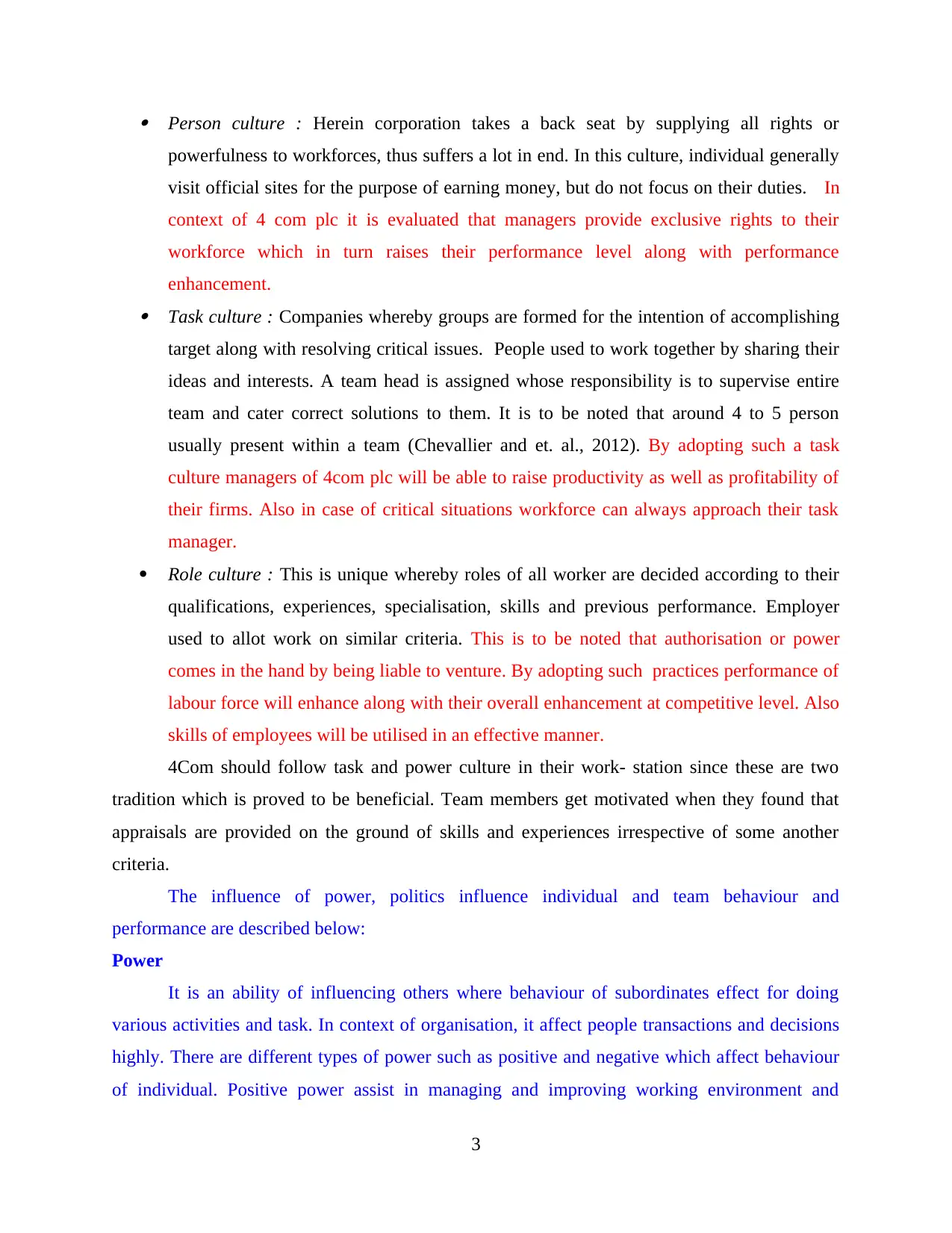
Person culture : Herein corporation takes a back seat by supplying all rights or
powerfulness to workforces, thus suffers a lot in end. In this culture, individual generally
visit official sites for the purpose of earning money, but do not focus on their duties. In
context of 4 com plc it is evaluated that managers provide exclusive rights to their
workforce which in turn raises their performance level along with performance
enhancement. Task culture : Companies whereby groups are formed for the intention of accomplishing
target along with resolving critical issues. People used to work together by sharing their
ideas and interests. A team head is assigned whose responsibility is to supervise entire
team and cater correct solutions to them. It is to be noted that around 4 to 5 person
usually present within a team (Chevallier and et. al., 2012). By adopting such a task
culture managers of 4com plc will be able to raise productivity as well as profitability of
their firms. Also in case of critical situations workforce can always approach their task
manager.
Role culture : This is unique whereby roles of all worker are decided according to their
qualifications, experiences, specialisation, skills and previous performance. Employer
used to allot work on similar criteria. This is to be noted that authorisation or power
comes in the hand by being liable to venture. By adopting such practices performance of
labour force will enhance along with their overall enhancement at competitive level. Also
skills of employees will be utilised in an effective manner.
4Com should follow task and power culture in their work- station since these are two
tradition which is proved to be beneficial. Team members get motivated when they found that
appraisals are provided on the ground of skills and experiences irrespective of some another
criteria.
The influence of power, politics influence individual and team behaviour and
performance are described below:
Power
It is an ability of influencing others where behaviour of subordinates effect for doing
various activities and task. In context of organisation, it affect people transactions and decisions
highly. There are different types of power such as positive and negative which affect behaviour
of individual. Positive power assist in managing and improving working environment and
3
powerfulness to workforces, thus suffers a lot in end. In this culture, individual generally
visit official sites for the purpose of earning money, but do not focus on their duties. In
context of 4 com plc it is evaluated that managers provide exclusive rights to their
workforce which in turn raises their performance level along with performance
enhancement. Task culture : Companies whereby groups are formed for the intention of accomplishing
target along with resolving critical issues. People used to work together by sharing their
ideas and interests. A team head is assigned whose responsibility is to supervise entire
team and cater correct solutions to them. It is to be noted that around 4 to 5 person
usually present within a team (Chevallier and et. al., 2012). By adopting such a task
culture managers of 4com plc will be able to raise productivity as well as profitability of
their firms. Also in case of critical situations workforce can always approach their task
manager.
Role culture : This is unique whereby roles of all worker are decided according to their
qualifications, experiences, specialisation, skills and previous performance. Employer
used to allot work on similar criteria. This is to be noted that authorisation or power
comes in the hand by being liable to venture. By adopting such practices performance of
labour force will enhance along with their overall enhancement at competitive level. Also
skills of employees will be utilised in an effective manner.
4Com should follow task and power culture in their work- station since these are two
tradition which is proved to be beneficial. Team members get motivated when they found that
appraisals are provided on the ground of skills and experiences irrespective of some another
criteria.
The influence of power, politics influence individual and team behaviour and
performance are described below:
Power
It is an ability of influencing others where behaviour of subordinates effect for doing
various activities and task. In context of organisation, it affect people transactions and decisions
highly. There are different types of power such as positive and negative which affect behaviour
of individual. Positive power assist in managing and improving working environment and
3
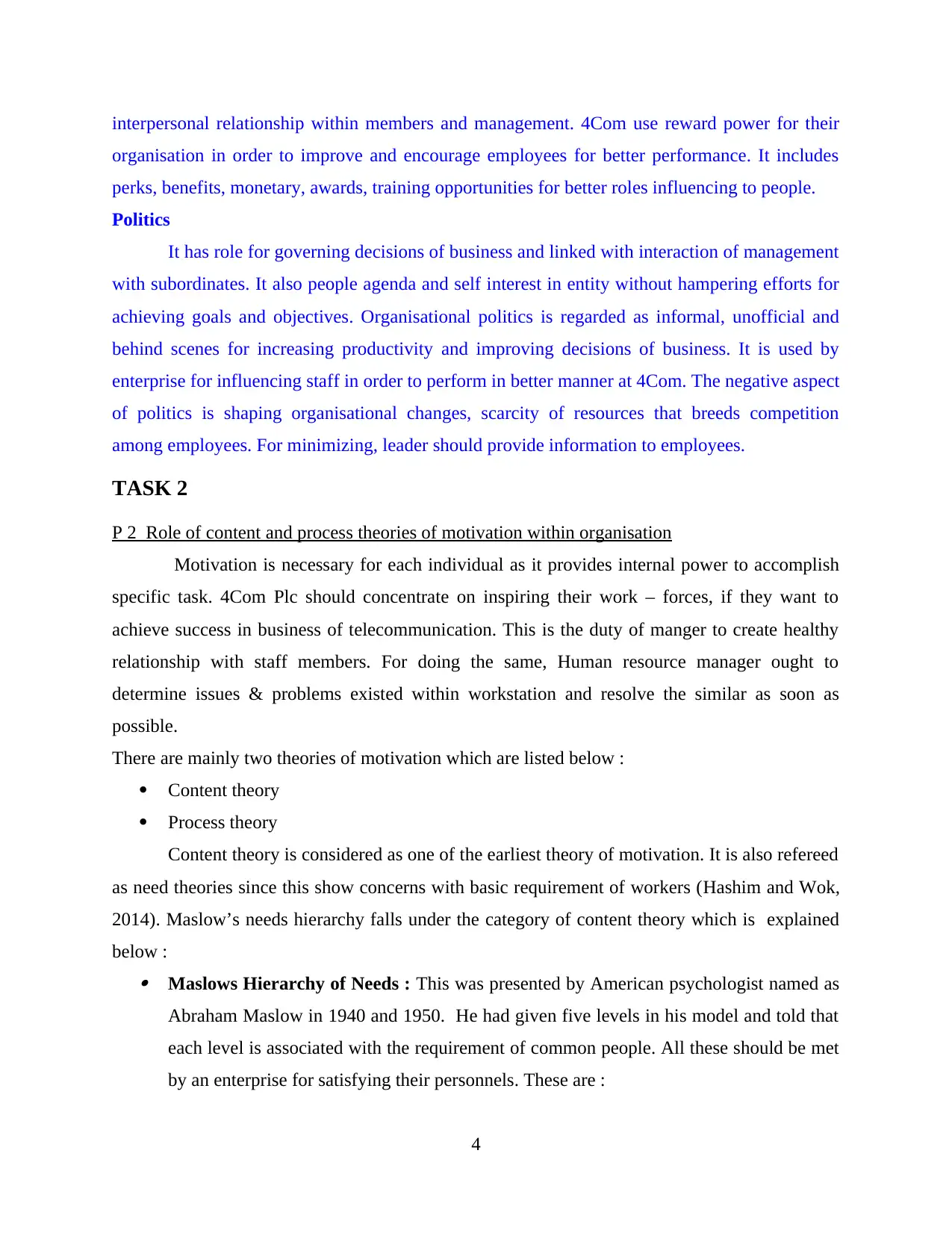
interpersonal relationship within members and management. 4Com use reward power for their
organisation in order to improve and encourage employees for better performance. It includes
perks, benefits, monetary, awards, training opportunities for better roles influencing to people.
Politics
It has role for governing decisions of business and linked with interaction of management
with subordinates. It also people agenda and self interest in entity without hampering efforts for
achieving goals and objectives. Organisational politics is regarded as informal, unofficial and
behind scenes for increasing productivity and improving decisions of business. It is used by
enterprise for influencing staff in order to perform in better manner at 4Com. The negative aspect
of politics is shaping organisational changes, scarcity of resources that breeds competition
among employees. For minimizing, leader should provide information to employees.
TASK 2
P 2 Role of content and process theories of motivation within organisation
Motivation is necessary for each individual as it provides internal power to accomplish
specific task. 4Com Plc should concentrate on inspiring their work – forces, if they want to
achieve success in business of telecommunication. This is the duty of manger to create healthy
relationship with staff members. For doing the same, Human resource manager ought to
determine issues & problems existed within workstation and resolve the similar as soon as
possible.
There are mainly two theories of motivation which are listed below :
Content theory
Process theory
Content theory is considered as one of the earliest theory of motivation. It is also refereed
as need theories since this show concerns with basic requirement of workers (Hashim and Wok,
2014). Maslow’s needs hierarchy falls under the category of content theory which is explained
below : Maslows Hierarchy of Needs : This was presented by American psychologist named as
Abraham Maslow in 1940 and 1950. He had given five levels in his model and told that
each level is associated with the requirement of common people. All these should be met
by an enterprise for satisfying their personnels. These are :
4
organisation in order to improve and encourage employees for better performance. It includes
perks, benefits, monetary, awards, training opportunities for better roles influencing to people.
Politics
It has role for governing decisions of business and linked with interaction of management
with subordinates. It also people agenda and self interest in entity without hampering efforts for
achieving goals and objectives. Organisational politics is regarded as informal, unofficial and
behind scenes for increasing productivity and improving decisions of business. It is used by
enterprise for influencing staff in order to perform in better manner at 4Com. The negative aspect
of politics is shaping organisational changes, scarcity of resources that breeds competition
among employees. For minimizing, leader should provide information to employees.
TASK 2
P 2 Role of content and process theories of motivation within organisation
Motivation is necessary for each individual as it provides internal power to accomplish
specific task. 4Com Plc should concentrate on inspiring their work – forces, if they want to
achieve success in business of telecommunication. This is the duty of manger to create healthy
relationship with staff members. For doing the same, Human resource manager ought to
determine issues & problems existed within workstation and resolve the similar as soon as
possible.
There are mainly two theories of motivation which are listed below :
Content theory
Process theory
Content theory is considered as one of the earliest theory of motivation. It is also refereed
as need theories since this show concerns with basic requirement of workers (Hashim and Wok,
2014). Maslow’s needs hierarchy falls under the category of content theory which is explained
below : Maslows Hierarchy of Needs : This was presented by American psychologist named as
Abraham Maslow in 1940 and 1950. He had given five levels in his model and told that
each level is associated with the requirement of common people. All these should be met
by an enterprise for satisfying their personnels. These are :
4
⊘ This is a preview!⊘
Do you want full access?
Subscribe today to unlock all pages.

Trusted by 1+ million students worldwide
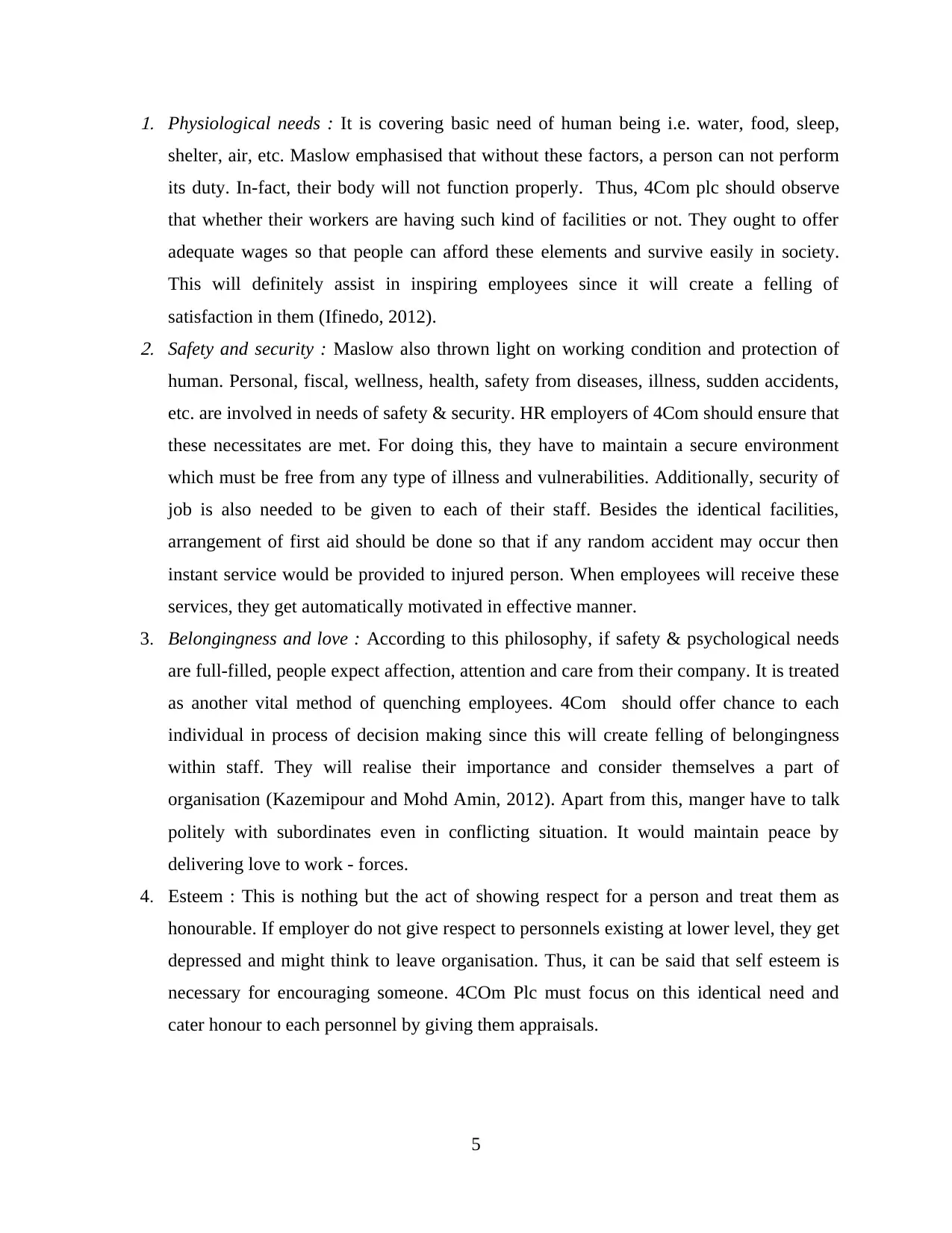
1. Physiological needs : It is covering basic need of human being i.e. water, food, sleep,
shelter, air, etc. Maslow emphasised that without these factors, a person can not perform
its duty. In-fact, their body will not function properly. Thus, 4Com plc should observe
that whether their workers are having such kind of facilities or not. They ought to offer
adequate wages so that people can afford these elements and survive easily in society.
This will definitely assist in inspiring employees since it will create a felling of
satisfaction in them (Ifinedo, 2012).2. Safety and security : Maslow also thrown light on working condition and protection of
human. Personal, fiscal, wellness, health, safety from diseases, illness, sudden accidents,
etc. are involved in needs of safety & security. HR employers of 4Com should ensure that
these necessitates are met. For doing this, they have to maintain a secure environment
which must be free from any type of illness and vulnerabilities. Additionally, security of
job is also needed to be given to each of their staff. Besides the identical facilities,
arrangement of first aid should be done so that if any random accident may occur then
instant service would be provided to injured person. When employees will receive these
services, they get automatically motivated in effective manner.
3. Belongingness and love : According to this philosophy, if safety & psychological needs
are full-filled, people expect affection, attention and care from their company. It is treated
as another vital method of quenching employees. 4Com should offer chance to each
individual in process of decision making since this will create felling of belongingness
within staff. They will realise their importance and consider themselves a part of
organisation (Kazemipour and Mohd Amin, 2012). Apart from this, manger have to talk
politely with subordinates even in conflicting situation. It would maintain peace by
delivering love to work - forces.
4. Esteem : This is nothing but the act of showing respect for a person and treat them as
honourable. If employer do not give respect to personnels existing at lower level, they get
depressed and might think to leave organisation. Thus, it can be said that self esteem is
necessary for encouraging someone. 4COm Plc must focus on this identical need and
cater honour to each personnel by giving them appraisals.
5
shelter, air, etc. Maslow emphasised that without these factors, a person can not perform
its duty. In-fact, their body will not function properly. Thus, 4Com plc should observe
that whether their workers are having such kind of facilities or not. They ought to offer
adequate wages so that people can afford these elements and survive easily in society.
This will definitely assist in inspiring employees since it will create a felling of
satisfaction in them (Ifinedo, 2012).2. Safety and security : Maslow also thrown light on working condition and protection of
human. Personal, fiscal, wellness, health, safety from diseases, illness, sudden accidents,
etc. are involved in needs of safety & security. HR employers of 4Com should ensure that
these necessitates are met. For doing this, they have to maintain a secure environment
which must be free from any type of illness and vulnerabilities. Additionally, security of
job is also needed to be given to each of their staff. Besides the identical facilities,
arrangement of first aid should be done so that if any random accident may occur then
instant service would be provided to injured person. When employees will receive these
services, they get automatically motivated in effective manner.
3. Belongingness and love : According to this philosophy, if safety & psychological needs
are full-filled, people expect affection, attention and care from their company. It is treated
as another vital method of quenching employees. 4Com should offer chance to each
individual in process of decision making since this will create felling of belongingness
within staff. They will realise their importance and consider themselves a part of
organisation (Kazemipour and Mohd Amin, 2012). Apart from this, manger have to talk
politely with subordinates even in conflicting situation. It would maintain peace by
delivering love to work - forces.
4. Esteem : This is nothing but the act of showing respect for a person and treat them as
honourable. If employer do not give respect to personnels existing at lower level, they get
depressed and might think to leave organisation. Thus, it can be said that self esteem is
necessary for encouraging someone. 4COm Plc must focus on this identical need and
cater honour to each personnel by giving them appraisals.
5
Paraphrase This Document
Need a fresh take? Get an instant paraphrase of this document with our AI Paraphraser
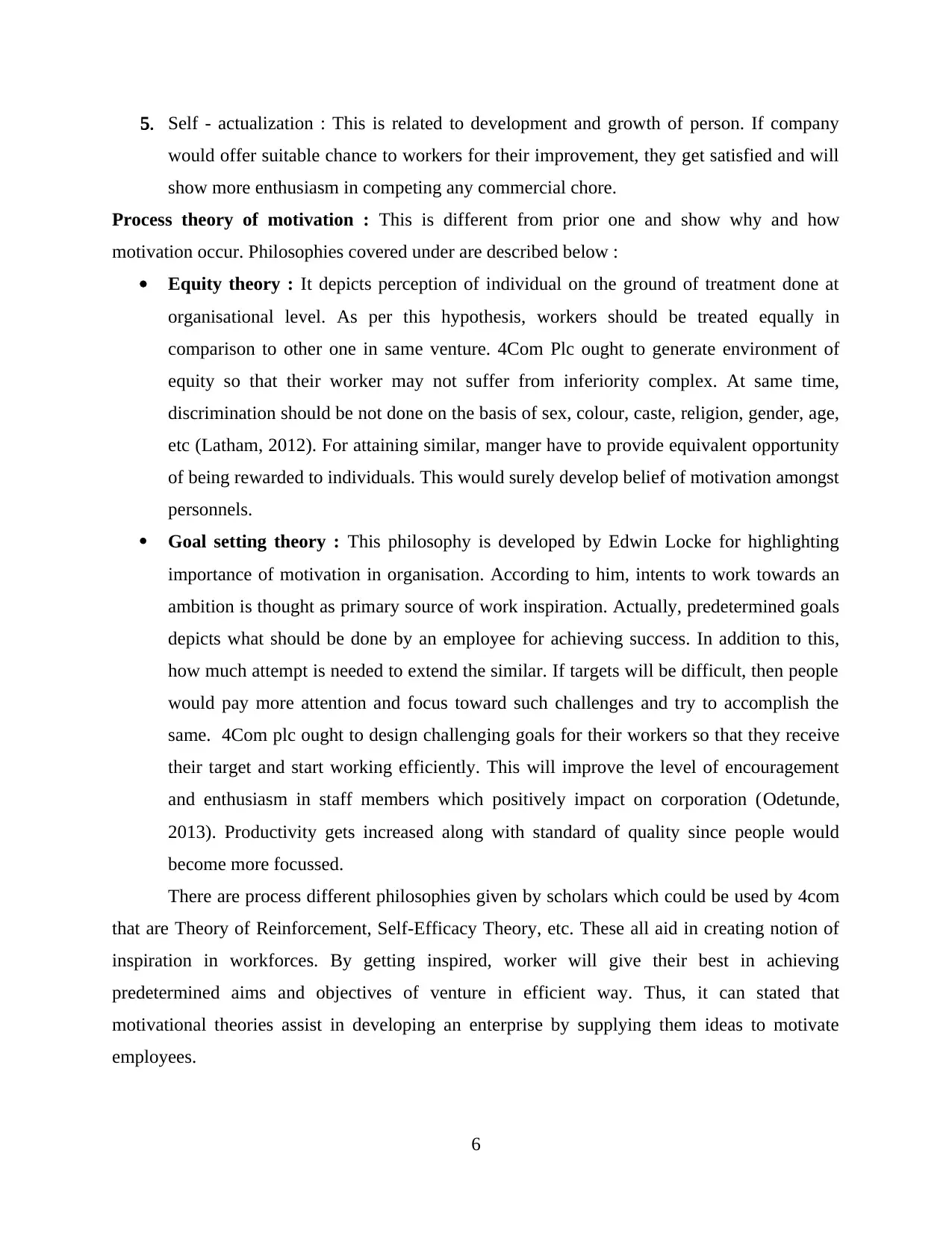
5. Self - actualization : This is related to development and growth of person. If company
would offer suitable chance to workers for their improvement, they get satisfied and will
show more enthusiasm in competing any commercial chore.
Process theory of motivation : This is different from prior one and show why and how
motivation occur. Philosophies covered under are described below :
Equity theory : It depicts perception of individual on the ground of treatment done at
organisational level. As per this hypothesis, workers should be treated equally in
comparison to other one in same venture. 4Com Plc ought to generate environment of
equity so that their worker may not suffer from inferiority complex. At same time,
discrimination should be not done on the basis of sex, colour, caste, religion, gender, age,
etc (Latham, 2012). For attaining similar, manger have to provide equivalent opportunity
of being rewarded to individuals. This would surely develop belief of motivation amongst
personnels.
Goal setting theory : This philosophy is developed by Edwin Locke for highlighting
importance of motivation in organisation. According to him, intents to work towards an
ambition is thought as primary source of work inspiration. Actually, predetermined goals
depicts what should be done by an employee for achieving success. In addition to this,
how much attempt is needed to extend the similar. If targets will be difficult, then people
would pay more attention and focus toward such challenges and try to accomplish the
same. 4Com plc ought to design challenging goals for their workers so that they receive
their target and start working efficiently. This will improve the level of encouragement
and enthusiasm in staff members which positively impact on corporation (Odetunde,
2013). Productivity gets increased along with standard of quality since people would
become more focussed.
There are process different philosophies given by scholars which could be used by 4com
that are Theory of Reinforcement, Self-Efficacy Theory, etc. These all aid in creating notion of
inspiration in workforces. By getting inspired, worker will give their best in achieving
predetermined aims and objectives of venture in efficient way. Thus, it can stated that
motivational theories assist in developing an enterprise by supplying them ideas to motivate
employees.
6
would offer suitable chance to workers for their improvement, they get satisfied and will
show more enthusiasm in competing any commercial chore.
Process theory of motivation : This is different from prior one and show why and how
motivation occur. Philosophies covered under are described below :
Equity theory : It depicts perception of individual on the ground of treatment done at
organisational level. As per this hypothesis, workers should be treated equally in
comparison to other one in same venture. 4Com Plc ought to generate environment of
equity so that their worker may not suffer from inferiority complex. At same time,
discrimination should be not done on the basis of sex, colour, caste, religion, gender, age,
etc (Latham, 2012). For attaining similar, manger have to provide equivalent opportunity
of being rewarded to individuals. This would surely develop belief of motivation amongst
personnels.
Goal setting theory : This philosophy is developed by Edwin Locke for highlighting
importance of motivation in organisation. According to him, intents to work towards an
ambition is thought as primary source of work inspiration. Actually, predetermined goals
depicts what should be done by an employee for achieving success. In addition to this,
how much attempt is needed to extend the similar. If targets will be difficult, then people
would pay more attention and focus toward such challenges and try to accomplish the
same. 4Com plc ought to design challenging goals for their workers so that they receive
their target and start working efficiently. This will improve the level of encouragement
and enthusiasm in staff members which positively impact on corporation (Odetunde,
2013). Productivity gets increased along with standard of quality since people would
become more focussed.
There are process different philosophies given by scholars which could be used by 4com
that are Theory of Reinforcement, Self-Efficacy Theory, etc. These all aid in creating notion of
inspiration in workforces. By getting inspired, worker will give their best in achieving
predetermined aims and objectives of venture in efficient way. Thus, it can stated that
motivational theories assist in developing an enterprise by supplying them ideas to motivate
employees.
6
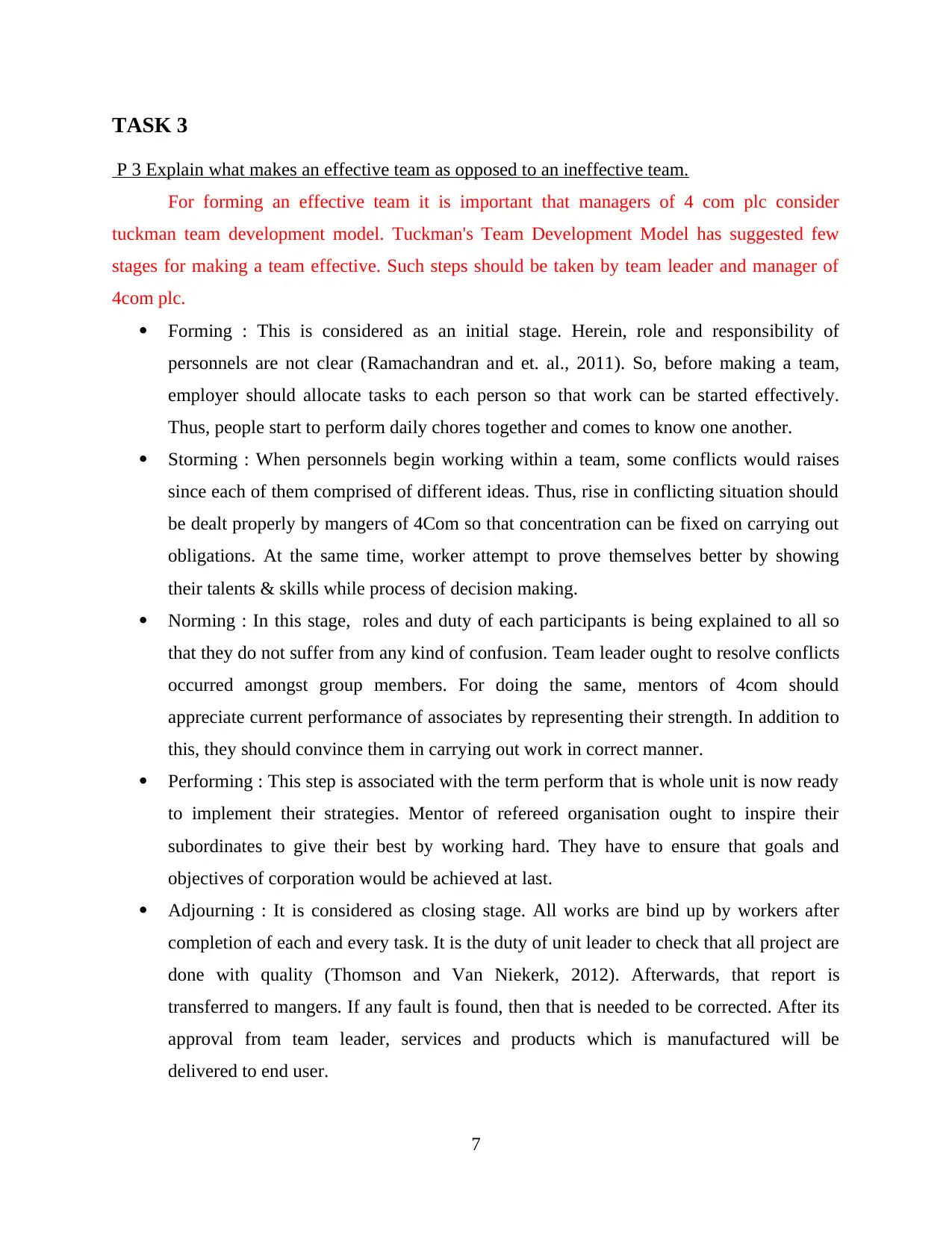
TASK 3
P 3 Explain what makes an effective team as opposed to an ineffective team.
For forming an effective team it is important that managers of 4 com plc consider
tuckman team development model. Tuckman's Team Development Model has suggested few
stages for making a team effective. Such steps should be taken by team leader and manager of
4com plc.
Forming : This is considered as an initial stage. Herein, role and responsibility of
personnels are not clear (Ramachandran and et. al., 2011). So, before making a team,
employer should allocate tasks to each person so that work can be started effectively.
Thus, people start to perform daily chores together and comes to know one another.
Storming : When personnels begin working within a team, some conflicts would raises
since each of them comprised of different ideas. Thus, rise in conflicting situation should
be dealt properly by mangers of 4Com so that concentration can be fixed on carrying out
obligations. At the same time, worker attempt to prove themselves better by showing
their talents & skills while process of decision making.
Norming : In this stage, roles and duty of each participants is being explained to all so
that they do not suffer from any kind of confusion. Team leader ought to resolve conflicts
occurred amongst group members. For doing the same, mentors of 4com should
appreciate current performance of associates by representing their strength. In addition to
this, they should convince them in carrying out work in correct manner.
Performing : This step is associated with the term perform that is whole unit is now ready
to implement their strategies. Mentor of refereed organisation ought to inspire their
subordinates to give their best by working hard. They have to ensure that goals and
objectives of corporation would be achieved at last.
Adjourning : It is considered as closing stage. All works are bind up by workers after
completion of each and every task. It is the duty of unit leader to check that all project are
done with quality (Thomson and Van Niekerk, 2012). Afterwards, that report is
transferred to mangers. If any fault is found, then that is needed to be corrected. After its
approval from team leader, services and products which is manufactured will be
delivered to end user.
7
P 3 Explain what makes an effective team as opposed to an ineffective team.
For forming an effective team it is important that managers of 4 com plc consider
tuckman team development model. Tuckman's Team Development Model has suggested few
stages for making a team effective. Such steps should be taken by team leader and manager of
4com plc.
Forming : This is considered as an initial stage. Herein, role and responsibility of
personnels are not clear (Ramachandran and et. al., 2011). So, before making a team,
employer should allocate tasks to each person so that work can be started effectively.
Thus, people start to perform daily chores together and comes to know one another.
Storming : When personnels begin working within a team, some conflicts would raises
since each of them comprised of different ideas. Thus, rise in conflicting situation should
be dealt properly by mangers of 4Com so that concentration can be fixed on carrying out
obligations. At the same time, worker attempt to prove themselves better by showing
their talents & skills while process of decision making.
Norming : In this stage, roles and duty of each participants is being explained to all so
that they do not suffer from any kind of confusion. Team leader ought to resolve conflicts
occurred amongst group members. For doing the same, mentors of 4com should
appreciate current performance of associates by representing their strength. In addition to
this, they should convince them in carrying out work in correct manner.
Performing : This step is associated with the term perform that is whole unit is now ready
to implement their strategies. Mentor of refereed organisation ought to inspire their
subordinates to give their best by working hard. They have to ensure that goals and
objectives of corporation would be achieved at last.
Adjourning : It is considered as closing stage. All works are bind up by workers after
completion of each and every task. It is the duty of unit leader to check that all project are
done with quality (Thomson and Van Niekerk, 2012). Afterwards, that report is
transferred to mangers. If any fault is found, then that is needed to be corrected. After its
approval from team leader, services and products which is manufactured will be
delivered to end user.
7
⊘ This is a preview!⊘
Do you want full access?
Subscribe today to unlock all pages.

Trusted by 1+ million students worldwide
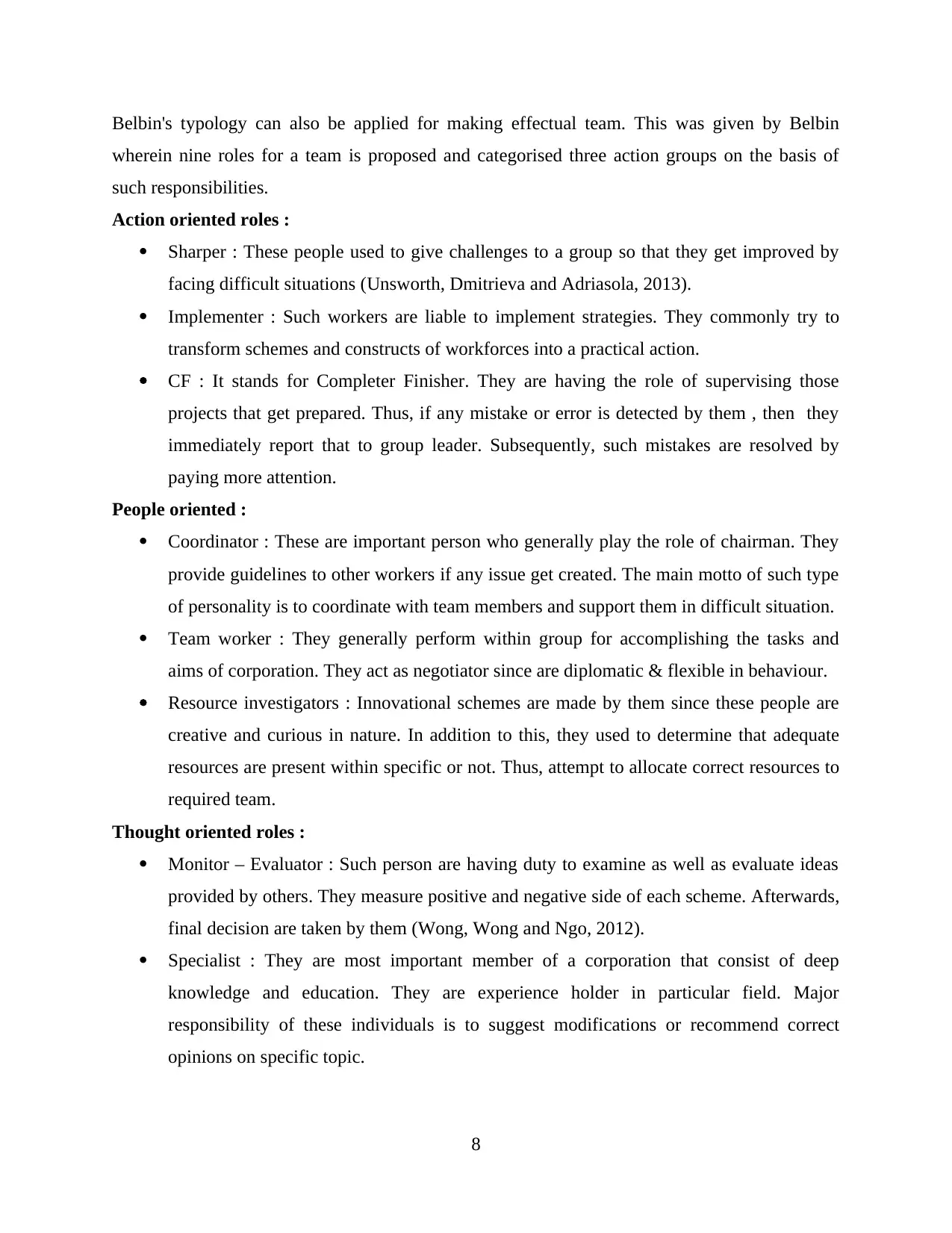
Belbin's typology can also be applied for making effectual team. This was given by Belbin
wherein nine roles for a team is proposed and categorised three action groups on the basis of
such responsibilities.
Action oriented roles :
Sharper : These people used to give challenges to a group so that they get improved by
facing difficult situations (Unsworth, Dmitrieva and Adriasola, 2013).
Implementer : Such workers are liable to implement strategies. They commonly try to
transform schemes and constructs of workforces into a practical action.
CF : It stands for Completer Finisher. They are having the role of supervising those
projects that get prepared. Thus, if any mistake or error is detected by them , then they
immediately report that to group leader. Subsequently, such mistakes are resolved by
paying more attention.
People oriented :
Coordinator : These are important person who generally play the role of chairman. They
provide guidelines to other workers if any issue get created. The main motto of such type
of personality is to coordinate with team members and support them in difficult situation.
Team worker : They generally perform within group for accomplishing the tasks and
aims of corporation. They act as negotiator since are diplomatic & flexible in behaviour.
Resource investigators : Innovational schemes are made by them since these people are
creative and curious in nature. In addition to this, they used to determine that adequate
resources are present within specific or not. Thus, attempt to allocate correct resources to
required team.
Thought oriented roles :
Monitor – Evaluator : Such person are having duty to examine as well as evaluate ideas
provided by others. They measure positive and negative side of each scheme. Afterwards,
final decision are taken by them (Wong, Wong and Ngo, 2012).
Specialist : They are most important member of a corporation that consist of deep
knowledge and education. They are experience holder in particular field. Major
responsibility of these individuals is to suggest modifications or recommend correct
opinions on specific topic.
8
wherein nine roles for a team is proposed and categorised three action groups on the basis of
such responsibilities.
Action oriented roles :
Sharper : These people used to give challenges to a group so that they get improved by
facing difficult situations (Unsworth, Dmitrieva and Adriasola, 2013).
Implementer : Such workers are liable to implement strategies. They commonly try to
transform schemes and constructs of workforces into a practical action.
CF : It stands for Completer Finisher. They are having the role of supervising those
projects that get prepared. Thus, if any mistake or error is detected by them , then they
immediately report that to group leader. Subsequently, such mistakes are resolved by
paying more attention.
People oriented :
Coordinator : These are important person who generally play the role of chairman. They
provide guidelines to other workers if any issue get created. The main motto of such type
of personality is to coordinate with team members and support them in difficult situation.
Team worker : They generally perform within group for accomplishing the tasks and
aims of corporation. They act as negotiator since are diplomatic & flexible in behaviour.
Resource investigators : Innovational schemes are made by them since these people are
creative and curious in nature. In addition to this, they used to determine that adequate
resources are present within specific or not. Thus, attempt to allocate correct resources to
required team.
Thought oriented roles :
Monitor – Evaluator : Such person are having duty to examine as well as evaluate ideas
provided by others. They measure positive and negative side of each scheme. Afterwards,
final decision are taken by them (Wong, Wong and Ngo, 2012).
Specialist : They are most important member of a corporation that consist of deep
knowledge and education. They are experience holder in particular field. Major
responsibility of these individuals is to suggest modifications or recommend correct
opinions on specific topic.
8
Paraphrase This Document
Need a fresh take? Get an instant paraphrase of this document with our AI Paraphraser
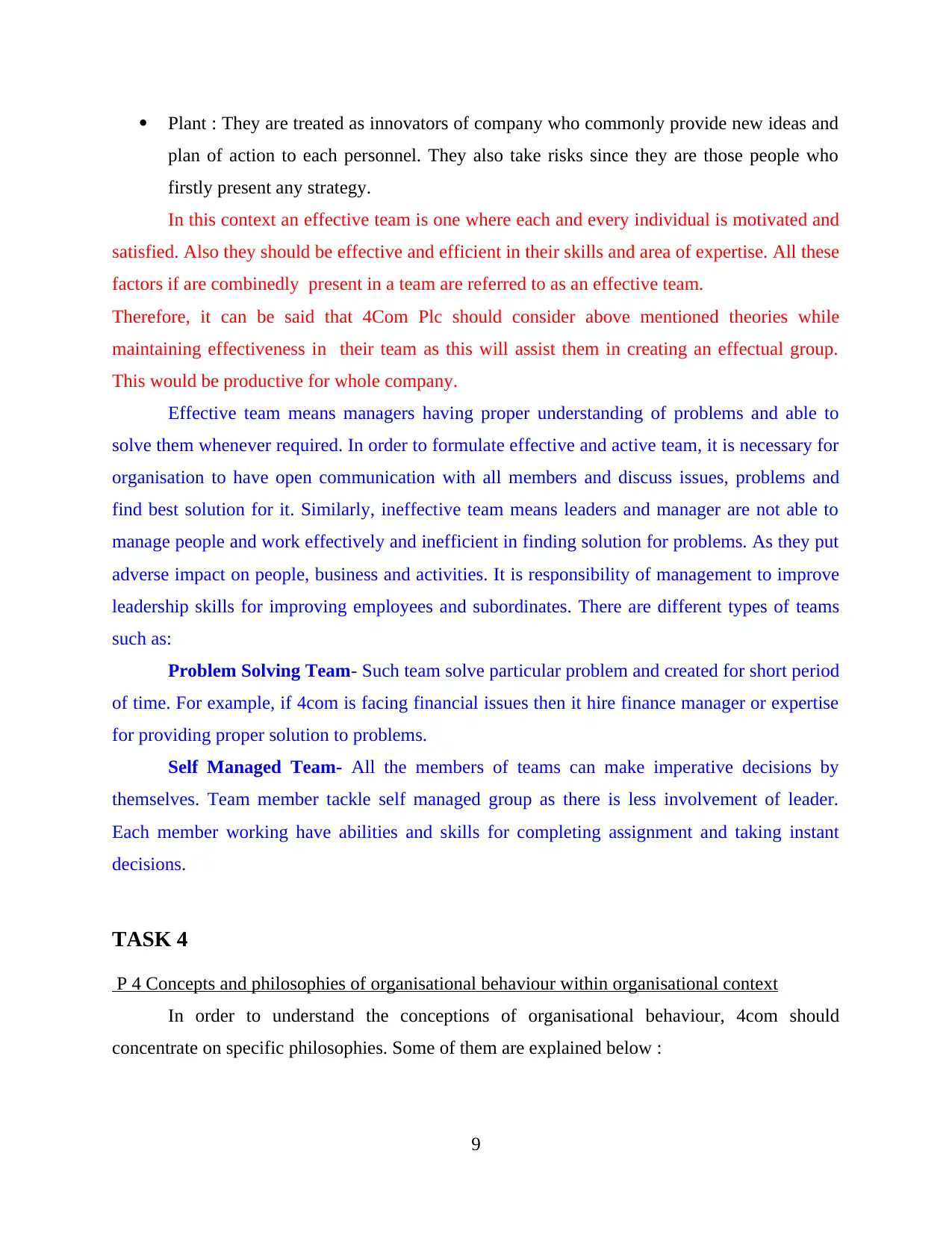
Plant : They are treated as innovators of company who commonly provide new ideas and
plan of action to each personnel. They also take risks since they are those people who
firstly present any strategy.
In this context an effective team is one where each and every individual is motivated and
satisfied. Also they should be effective and efficient in their skills and area of expertise. All these
factors if are combinedly present in a team are referred to as an effective team.
Therefore, it can be said that 4Com Plc should consider above mentioned theories while
maintaining effectiveness in their team as this will assist them in creating an effectual group.
This would be productive for whole company.
Effective team means managers having proper understanding of problems and able to
solve them whenever required. In order to formulate effective and active team, it is necessary for
organisation to have open communication with all members and discuss issues, problems and
find best solution for it. Similarly, ineffective team means leaders and manager are not able to
manage people and work effectively and inefficient in finding solution for problems. As they put
adverse impact on people, business and activities. It is responsibility of management to improve
leadership skills for improving employees and subordinates. There are different types of teams
such as:
Problem Solving Team- Such team solve particular problem and created for short period
of time. For example, if 4com is facing financial issues then it hire finance manager or expertise
for providing proper solution to problems.
Self Managed Team- All the members of teams can make imperative decisions by
themselves. Team member tackle self managed group as there is less involvement of leader.
Each member working have abilities and skills for completing assignment and taking instant
decisions.
TASK 4
P 4 Concepts and philosophies of organisational behaviour within organisational context
In order to understand the conceptions of organisational behaviour, 4com should
concentrate on specific philosophies. Some of them are explained below :
9
plan of action to each personnel. They also take risks since they are those people who
firstly present any strategy.
In this context an effective team is one where each and every individual is motivated and
satisfied. Also they should be effective and efficient in their skills and area of expertise. All these
factors if are combinedly present in a team are referred to as an effective team.
Therefore, it can be said that 4Com Plc should consider above mentioned theories while
maintaining effectiveness in their team as this will assist them in creating an effectual group.
This would be productive for whole company.
Effective team means managers having proper understanding of problems and able to
solve them whenever required. In order to formulate effective and active team, it is necessary for
organisation to have open communication with all members and discuss issues, problems and
find best solution for it. Similarly, ineffective team means leaders and manager are not able to
manage people and work effectively and inefficient in finding solution for problems. As they put
adverse impact on people, business and activities. It is responsibility of management to improve
leadership skills for improving employees and subordinates. There are different types of teams
such as:
Problem Solving Team- Such team solve particular problem and created for short period
of time. For example, if 4com is facing financial issues then it hire finance manager or expertise
for providing proper solution to problems.
Self Managed Team- All the members of teams can make imperative decisions by
themselves. Team member tackle self managed group as there is less involvement of leader.
Each member working have abilities and skills for completing assignment and taking instant
decisions.
TASK 4
P 4 Concepts and philosophies of organisational behaviour within organisational context
In order to understand the conceptions of organisational behaviour, 4com should
concentrate on specific philosophies. Some of them are explained below :
9
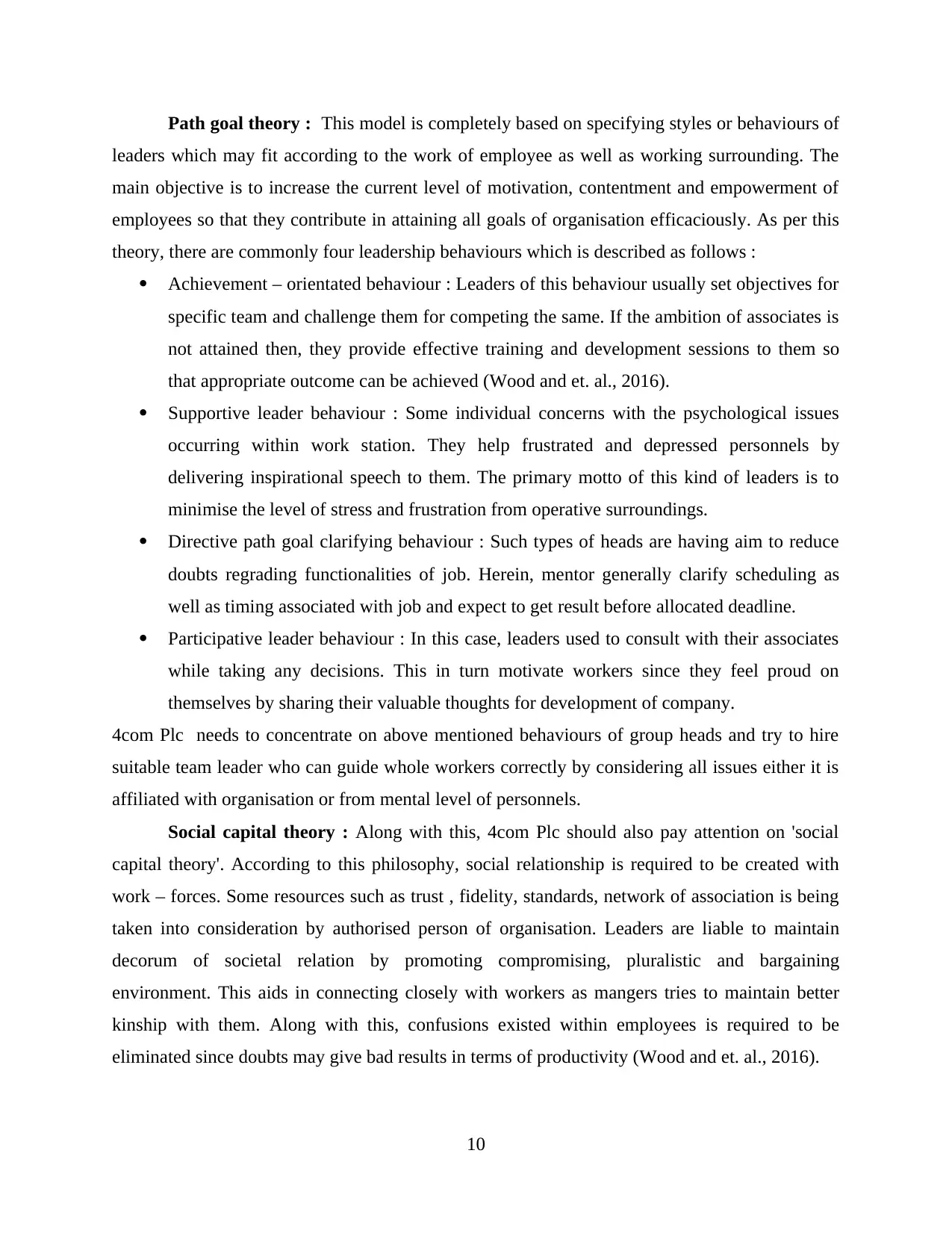
Path goal theory : This model is completely based on specifying styles or behaviours of
leaders which may fit according to the work of employee as well as working surrounding. The
main objective is to increase the current level of motivation, contentment and empowerment of
employees so that they contribute in attaining all goals of organisation efficaciously. As per this
theory, there are commonly four leadership behaviours which is described as follows :
Achievement – orientated behaviour : Leaders of this behaviour usually set objectives for
specific team and challenge them for competing the same. If the ambition of associates is
not attained then, they provide effective training and development sessions to them so
that appropriate outcome can be achieved (Wood and et. al., 2016).
Supportive leader behaviour : Some individual concerns with the psychological issues
occurring within work station. They help frustrated and depressed personnels by
delivering inspirational speech to them. The primary motto of this kind of leaders is to
minimise the level of stress and frustration from operative surroundings.
Directive path goal clarifying behaviour : Such types of heads are having aim to reduce
doubts regrading functionalities of job. Herein, mentor generally clarify scheduling as
well as timing associated with job and expect to get result before allocated deadline.
Participative leader behaviour : In this case, leaders used to consult with their associates
while taking any decisions. This in turn motivate workers since they feel proud on
themselves by sharing their valuable thoughts for development of company.
4com Plc needs to concentrate on above mentioned behaviours of group heads and try to hire
suitable team leader who can guide whole workers correctly by considering all issues either it is
affiliated with organisation or from mental level of personnels.
Social capital theory : Along with this, 4com Plc should also pay attention on 'social
capital theory'. According to this philosophy, social relationship is required to be created with
work – forces. Some resources such as trust , fidelity, standards, network of association is being
taken into consideration by authorised person of organisation. Leaders are liable to maintain
decorum of societal relation by promoting compromising, pluralistic and bargaining
environment. This aids in connecting closely with workers as mangers tries to maintain better
kinship with them. Along with this, confusions existed within employees is required to be
eliminated since doubts may give bad results in terms of productivity (Wood and et. al., 2016).
10
leaders which may fit according to the work of employee as well as working surrounding. The
main objective is to increase the current level of motivation, contentment and empowerment of
employees so that they contribute in attaining all goals of organisation efficaciously. As per this
theory, there are commonly four leadership behaviours which is described as follows :
Achievement – orientated behaviour : Leaders of this behaviour usually set objectives for
specific team and challenge them for competing the same. If the ambition of associates is
not attained then, they provide effective training and development sessions to them so
that appropriate outcome can be achieved (Wood and et. al., 2016).
Supportive leader behaviour : Some individual concerns with the psychological issues
occurring within work station. They help frustrated and depressed personnels by
delivering inspirational speech to them. The primary motto of this kind of leaders is to
minimise the level of stress and frustration from operative surroundings.
Directive path goal clarifying behaviour : Such types of heads are having aim to reduce
doubts regrading functionalities of job. Herein, mentor generally clarify scheduling as
well as timing associated with job and expect to get result before allocated deadline.
Participative leader behaviour : In this case, leaders used to consult with their associates
while taking any decisions. This in turn motivate workers since they feel proud on
themselves by sharing their valuable thoughts for development of company.
4com Plc needs to concentrate on above mentioned behaviours of group heads and try to hire
suitable team leader who can guide whole workers correctly by considering all issues either it is
affiliated with organisation or from mental level of personnels.
Social capital theory : Along with this, 4com Plc should also pay attention on 'social
capital theory'. According to this philosophy, social relationship is required to be created with
work – forces. Some resources such as trust , fidelity, standards, network of association is being
taken into consideration by authorised person of organisation. Leaders are liable to maintain
decorum of societal relation by promoting compromising, pluralistic and bargaining
environment. This aids in connecting closely with workers as mangers tries to maintain better
kinship with them. Along with this, confusions existed within employees is required to be
eliminated since doubts may give bad results in terms of productivity (Wood and et. al., 2016).
10
⊘ This is a preview!⊘
Do you want full access?
Subscribe today to unlock all pages.

Trusted by 1+ million students worldwide
1 out of 16
Related Documents
Your All-in-One AI-Powered Toolkit for Academic Success.
+13062052269
info@desklib.com
Available 24*7 on WhatsApp / Email
![[object Object]](/_next/static/media/star-bottom.7253800d.svg)
Unlock your academic potential
Copyright © 2020–2025 A2Z Services. All Rights Reserved. Developed and managed by ZUCOL.





